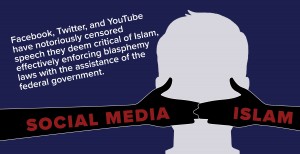 Today, the American Freedom Law Center (AFLC) filed its opening brief in the U.S. Court of Appeals for the D.C. Circuit in a federal lawsuit challenging Section 230 of the Communications Decency Act (CDA) under the First Amendment. Section 230 provides immunity from lawsuits to Facebook, Twitter, and YouTube, thereby permitting these social media giants to engage in government-sanctioned censorship and discriminatory business practices free from legal challenge.
Today, the American Freedom Law Center (AFLC) filed its opening brief in the U.S. Court of Appeals for the D.C. Circuit in a federal lawsuit challenging Section 230 of the Communications Decency Act (CDA) under the First Amendment. Section 230 provides immunity from lawsuits to Facebook, Twitter, and YouTube, thereby permitting these social media giants to engage in government-sanctioned censorship and discriminatory business practices free from legal challenge.
The lawsuit was brought on behalf of the American Freedom Defense Initiative (AFDI), Pamela Geller, Robert Spencer, and Jihad Watch. Geller and Spencer, along with the organizations they run, are often subject to censorship and discrimination by Facebook, Twitter and YouTube because of Geller’s and Spencer’s beliefs and views, which Facebook, Twitter, and YouTube consider expression that is offensive to Muslims. Such discrimination, which is largely religion-based in that these California businesses are favoring adherents of Islam over those who are not, is prohibited in many states, but particularly in California by the state’s anti-discrimination law, which is broadly construed to prohibit all forms of discrimination.
Section 230 immunizes Facebook, Twitter, and YouTube from civil liability for any action taken to “restrict access to or availability of material that” that they consider “to be obscene, lewd, lascivious, filthy, excessively violent, harassing, or otherwise objectionable, whether or not such material is constitutionally protected.” Consequently, these social media giants can discriminate with impunity.
The district court dismissed the complaint, claiming that Geller, Spencer, and their organizations lack standing to pursue their First Amendment challenge. The district court did not address the serious First Amendment concerns raised by the lawsuit. As such, the court did not rule on the merits.
In its decision on standing, the district court noted that the challengers “allege two forms of injury: an ‘inability to express certain views’ because of discriminatory censorship by private social-media companies and an ‘economic injury’ that flows from the companies’ removal of Plaintiffs’ online content.” The court, therefore, “assume[d]” that “Plaintiffs have . . . plausibly alleged an injury in fact.” However, it ultimately concluded that because this is an immunity statute, the Attorney General has no “enforcement” authority. Therefore, the plaintiffs could not show that their injury is “fairly traceable” to the Attorney General or that it could be redressed by the court. Consequently, the court refused to exercise its jurisdiction to decide the case.
Robert Muise, AFLC co-founder and senior counsel, issued the following statement:
“The district court is mistaken. There is no dispute that section 230 confers broad powers of censorship upon Facebook, Twitter, and YouTube officials, who can silence constitutionally protected speech and engage in discriminatory business practices with impunity by virtue of this power conferred by the federal government.”
Muise continued,
“As a result, section 230 is a federal statute that alters the legal relations between our clients and Facebook, Twitter, and YouTube, resulting in the withdrawal of legal protection against discrimination by private actors. Per Supreme Court precedent, such laws violate the Constitution. In Romer v. Evans, for example, the Supreme Court struck down on constitutional grounds a law that withdrew specific legal protection from the injuries caused by discrimination against homosexuals, including discrimination caused by private parties. There is no basis for a federal court to refuse to decide our First Amendment challenge to this federal law.”
David Yerushalmi, AFLC co-founder and senior counsel, added:
“Facebook, Twitter, and YouTube have notoriously censored speech that they deem critical of Islam, thereby effectively enforcing blasphemy laws here in the United States with the assistance of the federal government. We are hopeful that the D.C. Circuit will reverse the lower court’s decision, which essentially stands for the proposition that there are certain statutes that are ‘above the law’ and thus beyond constitutional challenge. That is a dangerous precedent.”
Yerushalmi added:
“It has been the top agenda item of Islamic supremacists to impose such standards on the West. Its leading proponents are the Muslim Brotherhood’s network of Islamist activist groups in the West and the Organization of Islamic Cooperation (OIC), which co-sponsored, with support from Obama and then-Secretary of State Clinton, a U.N. resolution which called on all nations to ban speech that could promote mere hostility to Islam. Facebook, Twitter, and YouTube are falling in line, and we will continue our fight to stop this assault on our First Amendment freedoms.”
